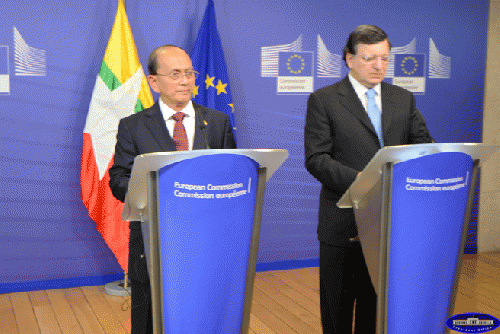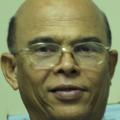
President Thein Sein held a press conference with European Commission President Mr. Jose Manuel Barroso at the office of the European Commission in Brussels of Belgium on 5 March 2013, Tuesday. (Photo: President Office Website)
(Image by President Office Website) Details DMCA
President Thein Sein held a press conference with European Commission President Mr. Jose Manuel Barroso at the office of the European Commission in Brussels of Belgium on 5 March 2013, Tuesday. (Photo: President Office Website) by President Office Website
President Thein Sein held a press conference with European Commission President Mr. Jose Manuel Barroso at the office of the European Commission in Brussels of Belgium on 5 March 2013, Tuesday. (Photo: President Office Website)
Burma
or Myanmar President Thein Sein met his Italian counterpart Mr. Giorgeo
Napolitano at Quieinale Palace in Rome, Italy Wednesday, the state-run New Light of Myanmar newspaper said Friday.
The two Presidents had discussed especially on current political and economic
reforms, protection of human rights, and development of peacemaking in Myanmar
(Burma).
Besides, they talked about closer partnership in trade, culture and other sectors. Italy also expected to give assistance in agricultural growth of Myanmar and microfinance works. In addition, two countries look forward to work together between the two armed forces. The Italian President was invited to travel around Myanmar by President Thein Sein.
The newspaper also said that President Thein Sein also met the Italian Prime Minister Prof Mario Monti at Chigi Palace. The two discussed about continuing reforms, peacemaking development and situations in Kachin and Rakhine states. Moreover, they talked on investment prospect in Burma or Myanmar and at the same time the two leaders agreed to strengthen bilateral ties between the two countries.
According to the state-run newspaper, Burma or Myanmar Union Minister for Foreign Affairs Wunna Maung Lwin and Italian Foreign Affairs Minister Mr. Giulio Maria Terzi Sant' Agata signed Agreement on the Treatment (Cancellation and Rescheduling) of the Debt and Agreement on Debt-for-Development Swap.
Additionally, Italian President and Prime Minister acknowledged the political, economic and executive reforms bring into being in Myanmar by the present Thein Sein government. As a result, the Italian government guarantees to offer more assistance and strong team spirit helping Myanmar so as to overcome challenges in transition stage.
As said by The New light of Myanmar, two nations agreed that EU should lift the overall sanctions against Myanmar (Burma) and national exporters of Myanmar should have access to Generalized Scheme of Preferences (GSP), promising actions to ensure positive results when the EU reviewed those cases.
President Thein Sein had meeting with European Commission President Mr. Jose Manuel Barroso at the office of the European Commission in Brussels of Belgium on Tuesday, 5 March. At the time also Thein Sein explained economic and political reform processes in his country and ongoing responsibilities, peacemaking process. Then, he especially asked for cooperation between Myanmar and EU in order to do away with economic sanctions and granting GSP (Generalized System of Preferences) to Myanmar, and humanitarian assistance for Kachin and Rakhine States.
He said during a press conference, "We are one of the poorest countries in the world. We lack the institutions that are necessary to manage our transition. We will face many challenges and there may well be set-backs. But you have my promise that we will continue this path until we succeed. My government will do everything in its powers to see Myanmar become the democratic, prosperous, and peaceful nation that I know all of our people deeply desire, and deserve."
Even though, there are appalling consequences of political, economic and social reforms, the country has learned from the facts. The troubles associated with the Letpadaung Taung project, land grabbing violence, riots in Rakhine State and the deadlock of peace in Kachin state are good examples.
Coincidentally, AFP News on Friday said that the UN human rights watcher Tomas Ojea Quintana, set to present a report to the United Nations Human Rights Council next week, urged foreign nations to be cautious as they jostle to do business in the former pariah state.
"I believe the international community is facing now a kind of tension between two kinds of interests. There's a strong interest on economics. A lot of countries want to start doing business with Myanmar. We need to welcome that, it's important, as it might bring development," Quintana told reporters.
According to Quintana, some laws - for instance rules concerning peaceful assembly - passed by the Thein Sein government go against the international human rights standards.
"People are still finding themselves arrested and imprisoned for holding demonstrations," Quintana said.
The civilian constitution effectively guarantees impunity for past human rights violations, he noted, and the army still appoints 25 percent of lawmakers.
(Note: You can view every article as one long page if you sign up as an Advocate Member, or higher).





